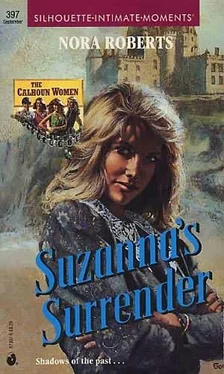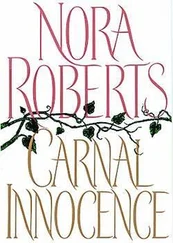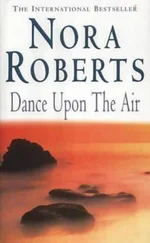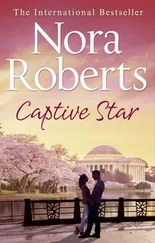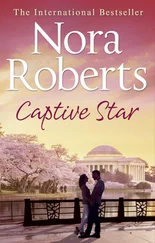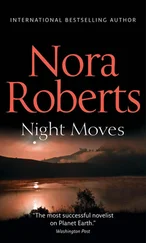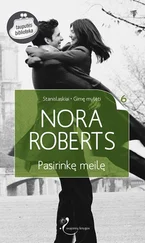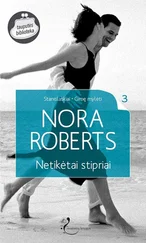“She'll get tired of us soon, and sail off down the Nile or the Amazon or whatever.”
“It can't be too soon for me. I'm afraid she's made up her mind to stay until we find the emeralds. Which is what this is all about anyway.” Coco calmed herself enough to stand at the wall again. “I was using my crystal to meditate. So soothing, and after an evening with Aunt Colleen –” She broke off because she was clenching her teeth. “In any case, I was just drifting along, when thoughts and images of Bianca filled my head.”
“That's not surprising,” Suzanne put in. “She's on all of our minds.”
“But this was very strong, dear. Very clear. There was such melancholy. I tell you, it brought tears to my eyes.” Coco pulled a handkerchief out of her caftan. “Then suddenly, I was thinking of you, and that was just as strong and clear. The connection between you and Bianca was unmistakable. I realized there had to be a reason, and thinking it through, I believe it's because of Holt Bradford.” Coco's eyes were shining now with discovery and enthusiasm. “You see, you've spoken to him, you've bridged the gap between Christian and Bianca.”
“I don't think you can call my conversations with Holt a bridge to anything.”
“No, he's the key, Suzanna. I doubt he understands what information he might have, but without him, we can't take the next step. I'm sure of it.”
With a restless move of her shoulders, Suzanna leaned against the wall. “Whatever he understands, he isn't interested.”
“Then you have to convince him otherwise.” She put a hand on Suzanna's and squeezed. “We need him. Until we find the emeralds, none of us will feel completely safe. The police haven't been able to find that miserable thief, and we don't know what he may try next time. Holt is our only link with the man Bianca loved.”
“I know.”
“Then you'll see him again. You'll talk to him.”
Suzanna looked toward the cliffs, toward the shadows. “Yes, I'll see him again.”
I knew she would come back. However unwise, however wrong it might have been, I looked for her every afternoon. On the days she did not come to the cliffs.
I would find myself staring up at the peaks of The Towers, aching for her in a way I had no right to ache for another man's wife. On the days she walked toward me, her hair like melted flame, that small, shy smile on her lips, I knew a joy like no other.
In the beginning, our conversations were polite and distant. The weather, unimportant village gossip, art and literature. As time passed, she became more at ease with me. She would speak of her children, and I came to know them through her. The little girl, Colleen, who liked pretty dresses and yearned for a pony. Young Ethan who only wanted to run and find adventure. And little Sean, who was just learning to crawl.
It took no special insight to see that her children were her life. Rarely did she speak of the parties, the musicals, the social gatherings I knew she attended almost nightly. Not at all did she speak of the man she had married.
I admit I wondered about him. Of course, it was common knowledge that Fergus Calhoun was an ambitious and wealthy man, one who had turned a few dollars into an empire during the course of his life. He commanded both respect and fear in the business world. For that I cared nothing.
It was the private man who obsessed me. The man who had the right to call her wife. The man who lay beside her at night, who touched her. The man who knew the texture of her skin, the taste of her mouth. The man who knew how it felt to have her move beneath him in the dark.
I was already in love with her. Perhaps I had been from the moment I had seen her walking with the child through the wild roses.
It would have been best for my sanity if I had chosen another place to paint. I could not. Already knowing I would have no more of her, could have no more than a few hours of conversation, I went back. Again and again.
She agreed to let me paint her. I began to see, as an artist must see, the inner woman. Beyond her beauty, beyond her composure and breeding was a desperately unhappy woman. I wanted to take her in my arms, to demand that she tell me what had put that sad and haunted look in her eyes. But I only painted her. I had no right to do more.
I have never been a patient or a noble man. Yet with her, I found I could be both. Without ever touching me, she changed me. Nothing would be the same for me after that summer – that all too brief summer when she would come, to sit on the rocks and look out to sea.
Even now, a lifetime later, I can walk to those cliffs and see her. I can smell the sea that never changes, and catch the drift of her perfume. I have only to pick a wild rose to remember the fiery lights of her hair. Closing my eyes, I hear the murmur of the water on the rocks below and her voice comes back as clear and as sweet as yesterday.
I am reminded of the last afternoon that first summer, when she stood beside me, close enough to touch, as distant as the moon.
“We leave in the morning,” she said, but didn't look at me. “The children are sorry to go.”
“And you?”
A faint smile touched her lips but not her eyes. “Sometimes I wonder if I’ve lived before. If my home was an island like this. The first time I came here, it was as if I had been waiting to see it again. I'll miss the sea.”
Perhaps it was only my own needs that made me think, when she glanced at me, that she would miss me, as well. Then she looked away again and sighed.
“New York is so different, so full of noise and urgency. It's hard to believe such a place exists when I stand here. Will you stay on the island through the winter?”
I thought of the cold and desolate months ahead and cursed fate for taunting me with what I could never have. “My plans change with my mood.” I said it lightly, fighting to keep the bitterness out of my voice.
“I envy you your freedom,” She turned away then to walk back to where her nearly completed portrait rested on my easel. “And your talent. You've made me more than what I am.”
“Less” I had to curl my hands into fists to keep from touching her. “Somethings can never be captured with paint and canvas.” “What will you, call it?”
“Bianca. Your name’s enough.”
She must have sensed my feelings, though I tried desperately to hold them in myself. Something came into her eyes as she looked at me, and the look held longer than it should. Then she stepped back, cautiously, like a woman who had wandered too close to the edge ofa cliff.
“One day you'll be famous, and people will beg for your work.”
I couldn't take my eyes off her, knowing I might never see her again. “I don't paint for fame.”
“No, and that's why you'll have it. When you do, I'll remember this summer. Goodbye, Christian.”
She walked away from me – for what I thought was the last time – away from the rocks, through the wild grass and the flowers that fight through both for the sun.
Coco Calhoun McPike didn't believe in leaving things up to chance particularly when her horoscope that day had advised her to take a more active part in a family matter and to visit an old acquaintance. She felt she could do both by paying an informal call on Holt Bradford.
She remembered him as a dark, hot-eyed boy who had delivered lobster and loitered around the village, waiting for trouble to happen. She also remembered that he had once stopped to change a flat for her while she'd been struggling on the side of the road trying to figure out which end of the jack to put under the bumper. He'd refused – stiffly, she recalled – her offer of payment and had hopped back on his motorcycle and ridden off before she'd properly thanked him.
Читать дальше
